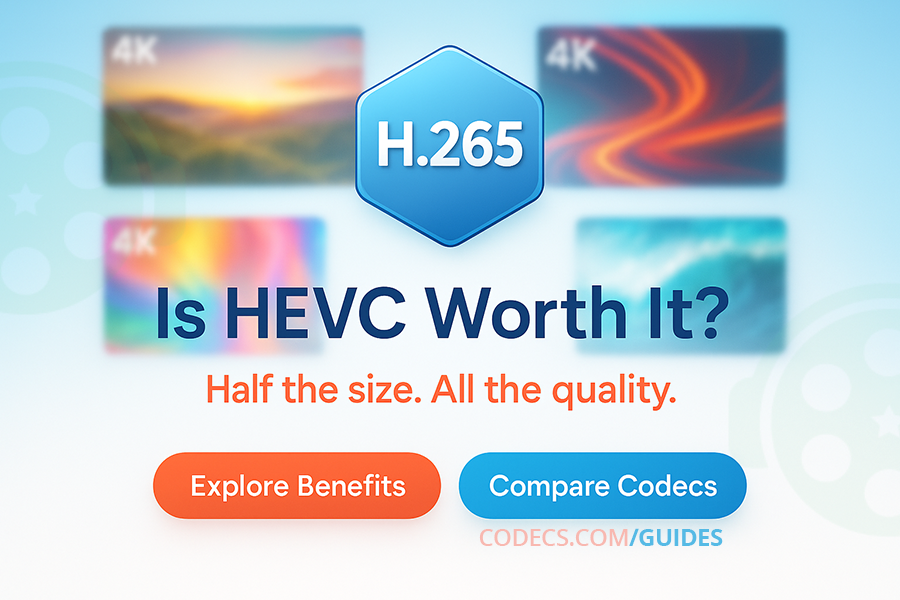Deciding between HEVC and H.264 depends on your specific situation. This guide helps you make the right choice for your needs.
When HEVC Makes Sense
HEVC shines when storage space is limited.
If you're running out of phone storage, archiving family videos, or dealing with large video collections, HEVC's space savings are valuable.
The codec typically reduces file sizes by 25-50% compared to H.264 at similar quality levels.
HEVC is also beneficial for high-resolution content.
If you regularly work with 4K videos, HEVC handles the large file sizes much better than H.264. The quality improvements are more noticeable at higher resolutions.
Users with modern devices should consider HEVC.
If your primary devices were manufactured after 2017, they likely support HEVC playback well. This includes recent iPhones, Android phones, smart TVs, and streaming devices.
When to Stick with H.264
Choose H.264 when compatibility is your priority.
If you frequently share videos with others, upload to various platforms, or use older devices, H.264's universal support eliminates headaches.
H.264 remains better for live streaming and real-time applications. The encoding is less computationally intensive, making it more suitable for streaming software and video calls.
If you're working with professional video editing software, check your workflow first.
While newer versions support HEVC, some older systems or plugins might struggle with HEVC files, causing slowdowns or compatibility issues.
Consider Your Hardware
Modern computers with dedicated graphics cards handle HEVC well, but older systems might struggle.
If your computer was built before 2016, or if you notice choppy playback with HEVC files, H.264 might be more practical.
→ See Is my PC able to play H.265 / HEVC media files?
Battery life matters for mobile devices.
While HEVC decoding is more efficient on newer chips, older phones might drain battery faster playing HEVC content compared to H.264.
Hybrid Approach
Many users benefit from a mixed strategy.
Record or archive in HEVC for space savings, but convert to H.264 when sharing or uploading to platforms with uncertain HEVC support.
Consider your content type as well.
Simple content like presentations or talking head videos benefit more from HEVC compression than complex, high-motion content like sports or action videos.
Is HEVC Worth It? - Summary Table
| Aspect | HEVC (H.265) | Comparison / Notes |
|---|---|---|
| Compression Efficiency | ~50% bitrate savings over H.264 for similar quality | Significant reduction in file size, noticeable in 4K/8K content |
| Quality | Excellent - retains quality even at low bitrates Ideal for high-resolution video (4K+) | Ideal for high-resolution video (4K+) |
| Encoding Complexity & CPU Cost | Higher compute demand, slower encoding | Marginalized by modern encoders and multi-threaded/cloud encoding |
| Device & OS Support | Widespread: Windows, macOS, Android, iOS, players | Must install HEVC extensions on Win 10; built-in Win 11 |
| Playback Compatibility | Supported on ~75% of devices | Non-supporting devices fallback to H.264 with potential performance issues |
| Alternatives (VP9, AV1, VVC) | VP9 and open-source AV1 are gaining; VVC offers ~50% over HEVC | AV1 is royalty-free but hardware support is still catching up |
| Recommendation | Worthwhile for high-res streaming/storage if hardware decoding is available | Trade-offs: encoding cost vs. bandwidth savings; still relevant despite newer codecs |












How to Download HEVC Video Extension for Free
THANKS BRO IT WORKS
Read More →Convert WAV to MP3: Best Quality Settings Gui...
MP3, AAC is only for vintage H/W players. For PC: FLAC. For smarphone: Opus 96~160 kbit/s
Read More →View AVIF Files on Windows - 3 Instant Soluti...
AV1 Microsoft.AV1VideoExtension_2.0.6.0_neutral_~_8wekyb3d8bbwe.AppxBundle + IrfanView iview473_setup.exe FastStone Image Viewer FSViewerSetup83.exe = Can't ...
Read More →